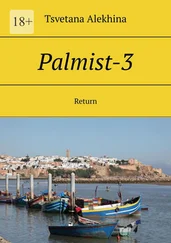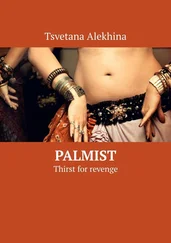Tsvetana Alеkhina - Choosing religion you choose fate
Здесь есть возможность читать онлайн «Tsvetana Alеkhina - Choosing religion you choose fate» — ознакомительный отрывок электронной книги совершенно бесплатно, а после прочтения отрывка купить полную версию. В некоторых случаях можно слушать аудио, скачать через торрент в формате fb2 и присутствует краткое содержание. ISBN: , Жанр: Религиозная литература, на английском языке. Описание произведения, (предисловие) а так же отзывы посетителей доступны на портале библиотеки ЛибКат.
- Название:Choosing religion you choose fate
- Автор:
- Жанр:
- Год:неизвестен
- ISBN:9785005596529
- Рейтинг книги:4 / 5. Голосов: 1
-
Избранное:Добавить в избранное
- Отзывы:
-
Ваша оценка:
- 80
- 1
- 2
- 3
- 4
- 5
Choosing religion you choose fate: краткое содержание, описание и аннотация
Предлагаем к чтению аннотацию, описание, краткое содержание или предисловие (зависит от того, что написал сам автор книги «Choosing religion you choose fate»). Если вы не нашли необходимую информацию о книге — напишите в комментариях, мы постараемся отыскать её.
Choosing religion you choose fate — читать онлайн ознакомительный отрывок
Ниже представлен текст книги, разбитый по страницам. Система сохранения места последней прочитанной страницы, позволяет с удобством читать онлайн бесплатно книгу «Choosing religion you choose fate», без необходимости каждый раз заново искать на чём Вы остановились. Поставьте закладку, и сможете в любой момент перейти на страницу, на которой закончили чтение.
Интервал:
Закладка:
How was Christianity accepted in Russia? Many European countries have adopted Christianity by force. The baptism of Russia was not without an onslaught, the majority were baptized quite peacefully. Baptism – personal and national – was a prerequisite for the contract of Prince Vladimir with Basil II, which was concluded in 987.
The contract read as follows:
Vasily II was ready to resume relations with the Russian-Byzantine side. But the military-political side had to accept the following conditions. To settle relations with neighboring lands, to eliminate conflicts in everything and, above all, in matters of faith. The new agreement was to seal forever-friendly ties between two Christian sovereigns and two Christian peoples. Having agreed to these conditions, Vladimir had to personally be baptized according to the Greek rite. It was also necessary to convert to Christianity as soon as possible his entourage of «boyars», «nobles», and «all the people of the Russian land».
Prince Vladimir was baptized himself, baptized his children, and then the whole house received holy baptism. In the future, near and distant relatives adopted Christianity. At the same time, the princely squad was baptized. With the adoption of baptism, the prince dissolved involuntary souls, male and female. The main part of the contract concluded with Basileus Basil II was successfully fulfilled. The last condition was the baptism of the Kievans, and then Vladimir became the sovereign of the Christian people.
Vladimir wanted to convince the townspeople of the insignificance of his old faith, and that they voluntarily accepted the upcoming religion. To do this, he gave the order to destroy the very sanctuary of Perun, which was being built a few years earlier «on a hill outside the courtyard of the teremny.» This was done to convince the Slavs of the Christian faith. The prince also gave an order to the servants, and the statue of Perun was thrown to the ground, tied to the tail of a horse, it was dragged from the «mountain» to the bank of the Dnieper. The statue was beaten with iron sticks; this was done in order to exorcise the demon. Perun was thrown into the water, the servants escorted him to the Dnieper rapids, and the idol sailed further downstream. Thus, Russia said goodbye to pagan idols.
At that time, the abuse of the defeated gods was accepted. In the city of Arkona there was the most revered sanctuary of Svyatovit, in 1168 when the Danes took the city. The Danish king Valdemar I ordered «to pull out this ancient idol of Svyatovit, especially revered by the Slavic people, a rope was thrown around the neck of the idol and it was dragged in front of the Slavs, then broken into pieces and thrown into the fire» (the message of the German chronicler Helmold).
Residents of the city of Kiev had to be prepared for the sacrament of baptism. In order for people to know the faith of Christ, Christian priests walked around the city and brought the word of God to people. Not many people agreed to the position of preachers, several local clergy and «priests of Korsun» who came with Vladimir. The prince faced a difficult task, to prepare local citizens in a short period. It had to be done before the summer. With the consent of the Patriarch of Constantinople, Vladimir brought several priests from Bulgaria to Kiev to help with baptism, as indicated in the Joachim Chronicle, he had a difficult task. Such a mass of people could be baptized only in the summer in the waters of the Dnieper. At that time, the temples were not adapted for the rite of the sacrament of baptism.
The baptism took place in the Dnieper River; the river replaced the church font. There were many people who wanted to convert to Christianity, men and women of different ages. The priests divided the people into several groups, they went into the water in turn, the first group went into the water up to the neck, the second up to the chest, and all the others were in shallow water. After the prayers were said, the priests gave each baptized group Christian names; the name was common, one for all, male for men and female for women. After being baptized, people continue to live with the name given at birth. Those who did not want to accept the sacrament of baptism were expelled from the city by the decree adopted above to the «deserts and forests». For the society of that time, which existed in conditions of constant military danger, disagreements and oppositions were unacceptable.
How Novgorod was baptized. Novgorod was not prepared for a new religion, it took time and patience to prepare it, at first everything went peacefully. Metropolitan Michael the Greek arrived in the city to prepare the townspeople, it was in 990. Upon his arrival, the first Christian Church of the Transfiguration was founded. Novgorodians reacted coldly to the new religion, and after the departure of the metropolitan and bishops, most continued to honor their gods and honor their ancestors. In 992, a second attempt was made to baptize Novgorod. The monarchy applied its power, an army was sent to the city, together with Bishop Joachim Korsunyanin, led by the uncle of the Grand Duke Dobrynya and Tysyatsky Putyat.
The Novgorodians received the news that an army was coming to them to destroy their shrines. Having gathered the veche, the residents decided not to betray their gods, and to strengthen their city. The bridge was dismantled; stone-throwing guns were exposed on the shore. The Kievans did not dare to attack first, and captured several instigators of the resistance by deception. From this turn of events, the Novgorodians were enraged. The priest Bogumil, nicknamed the Nightingale, called on his people to defend the faith of their ancestors. The people did not want to weaken their position and there was a riot in the city. The rebels robbed the houses of the first Novgorod Christians, and the Church of the Transfiguration was ruined. About five thousand citizens joined the battle with Putyata’s army. Dobryna had no choice but to resort to extreme measures. Novgorod was set on fire. This event took place at night; he crossed to the Sofia side and set fire to houses on the shore. It was a terrible disaster for the wooden city. Most residents asked for peace, some rushed to extinguish their homes.
The Novgorodians were offended; they went to be baptized forcibly, with great resentment. People were driven into the water in droves. Men were baptized above, and women below the Volkhov bridge. Novgorodians did not want to be baptized. And even on the day of the great sacrament, they tried to deceive themselves by saying that they had already been baptized. Therefore, crosses were put on the neck of all those who were baptized. So in Russia there was a tradition of body crosses.
The neighbors laughed at this event for a long time, recalling to the Novgorodians «how Putyata baptized them with fire and Dobrynya with a sword.» The rude imposition of faith has been imprinted in the memory of the Slavs for a long time. Over the years, Christianity has managed to win their souls. Baptism gave rise to the so-called double faith, a bizarre interweaving of pagan and Christian traditions. Memories of paganism live to this day in the folk festivals of Maslenitsa, Ivan Kupala and many other rituals.
After the baptism of Russia, paganism dominated the country for a long time, there were few pagan communities left, and they existed in some cities, and peacefully got along with Christian ones. At one end of the city, there was an Orthodox church, at the other there was a temple of a pagan god. After decades, the temples disappeared. Pagan magi and after baptism ruled the masses, especially in the villages. Many pagans for another hundred years after baptism worshipped idols and engaged in sacrifices. Christianity finally came to Russia in the 13th and 14th centuries, when there was a need to unite society in the face of the Golden Horde.
Читать дальшеИнтервал:
Закладка:
Похожие книги на «Choosing religion you choose fate»
Представляем Вашему вниманию похожие книги на «Choosing religion you choose fate» списком для выбора. Мы отобрали схожую по названию и смыслу литературу в надежде предоставить читателям больше вариантов отыскать новые, интересные, ещё непрочитанные произведения.
Обсуждение, отзывы о книге «Choosing religion you choose fate» и просто собственные мнения читателей. Оставьте ваши комментарии, напишите, что Вы думаете о произведении, его смысле или главных героях. Укажите что конкретно понравилось, а что нет, и почему Вы так считаете.












